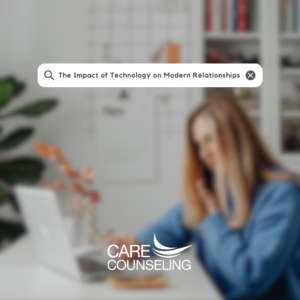The Impact of Technology on Modern Relationships
 In the digital age, technology has revolutionized the way we communicate, connect, and form relationships. While these advancements have undoubtedly made communication more accessible and convenient, they also come with a set of challenges. As we immerse ourselves in virtual interactions, the lines between the digital and real worlds can become blurred, potentially impacting the dynamics of modern relationships.
In the digital age, technology has revolutionized the way we communicate, connect, and form relationships. While these advancements have undoubtedly made communication more accessible and convenient, they also come with a set of challenges. As we immerse ourselves in virtual interactions, the lines between the digital and real worlds can become blurred, potentially impacting the dynamics of modern relationships.
The Digital Age and Relationship Dynamics
- Convenience in Communication
Technology has made communication more accessible than ever before. We can connect with loved ones across the globe through instant messaging, video calls, and social media platforms. This convenience has brought people closer and facilitated constant communication, even in long-distance relationships.
- Challenges in Authenticity
While technology enables communication, it can also pose challenges in determining the authenticity of relationships. Online interactions may not always reflect a person’s true self, leading to misunderstandings and misinterpretations. The absence of nonverbal cues, such as body language and tone of voice, can make it challenging to gauge emotional nuances accurately.
- Fostering a Fear of Missing Out (FOMO)
Social media platforms often showcase the highlight reels of people’s lives, creating a sense of comparison and fear of missing out (FOMO) in relationships. This can lead to feelings of inadequacy and pressure to maintain a certain image in the virtual world.
- The strain on Real-Life Connections
Excessive reliance on technology for communication can lead to a diminished focus on real-life interactions. Couples or friends might find themselves glued to their screens during face-to-face meetings, impacting the quality of their time together.
The Importance of Balancing Virtual and Real-Life Connections
- Cultivating Emotional Intimacy
While technology allows us to stay connected virtually, emotional intimacy is nurtured through meaningful face-to-face interactions. Spending quality time together, engaging in heartfelt conversations, and expressing emotions in person strengthen the bond between individuals.
- Establishing Trust and Transparency
Building trust in a relationship is vital for its success. Balancing virtual and real-life connections allows partners to share their lives authentically and openly. Face-to-face interactions facilitate deeper conversations and create a safe space for vulnerability and honesty.
- Improving Communication Skills
Engaging in face-to-face conversations improves communication skills, including active listening and understanding nonverbal cues. These skills are essential for resolving conflicts, expressing feelings, and fostering a strong emotional connection.
- Addressing Misunderstandings
Misunderstandings are common in any relationship. When relying solely on virtual communication, it can be challenging to address and resolve these issues effectively. In-person discussions allow for immediate clarification and prevent miscommunications from escalating.
- Reducing Dependence on Technology
Balancing virtual and real-life connections helps reduce dependence on technology for emotional support. Building real-life support systems ensures that individuals have a strong network of friends and loved ones to lean on during challenging times.
Tips for Balancing Virtual and Real-Life Connections
- Set Boundaries for Technology Use
Establish boundaries for technology use during real-life interactions. Agree to put away devices during meals, family gatherings, or date nights to ensure focused and meaningful connections.
- Prioritize Face-to-Face Interactions
Try to prioritize face-to-face interactions over virtual ones whenever possible. Schedule regular meetups with friends and loved ones to strengthen your real-life connections.
- Limit Social Media Consumption
Recognize the impact of social media on your emotions and self-perception. Limit the time spent on social media platforms and focus on building genuine connections in the real world.
- Engage in Shared Activities
Participate in activities that foster bonding and shared experiences. Engaging in hobbies, sports, or outings together strengthens the connection between individuals.
- Practice Active Listening
During real-life interactions, practice active listening to understand your partner’s or friend’s emotions, concerns, and needs. Show empathy and be present in the moment.
- Plan Tech-Free Days
Designate specific days as tech-free days where you prioritize spending quality time with loved ones without distractions from digital devices.
Technology has undoubtedly transformed modern relationships, offering convenience and accessibility in communication. However, striking a balance between virtual and real-life connections is essential for maintaining healthy and fulfilling relationships. While technology can bridge the gap between distances, emotional intimacy, trust, and effective communication are best nurtured through face-to-face interactions. By prioritizing real-life connections and setting boundaries for technology use, we can strengthen the foundations of our relationships and create lasting bonds built on authenticity, transparency, and genuine emotional connections.



























